EIPPEE Conference 2012: Advancing the use of research in education across Europe
The first conference of the Evidence Informed Policy and Practice in Education in Europe project took place on 9-10 May 2012 in The Hague, the Netherlands. The conference aimed to share ways of increasing the use of research evidence in education in Europe. It also sought to raise awareness and understanding about the different uses and impact of all types of research evidence on policy and practice in education. The conference was co-hosted by the Ministry of Education, Culture and Science in the Netherlands and the Department of Education and Training in Belgium.
Involving over 100 people from across Europe and beyond, the conference brought together different stakeholders including representatives from five international and European level government-related organisations, 27 national Ministries of Education and government-related organisations, 14 local and regional governments, seven commercial businesses and others including teachers, think tanks, trade unions and students.
The EIPPEE conference and capacity building The EIPPEE Conference aimed to develop capacity in three main ways: -
Pre-conference training workshop A pre-conference training workshop was available for a limited number of participants at no extra charge. This workshop introduced the concept of evidence informed policy and practice and demonstrated the role that systematic reviews can play in this process. The workshop showed how systematic reviews can be used to address all types of research questions and analyse all types of primary research; from conceptual to statistical studies. The workshop also discussed the different stages that are involved in undertaking a systematic review. -
Using existing evidence to address current policy issues The conference included a special session looking at how existing evidence can be used to address the policy issue of early school leaving in Europe. This session was titled: 'Evidence use: Engaging with systematic reviews in early school leaving'. The aim of this session was to facilitate participants to explore the practical, and intellectual thinking issues in applying knowledge generated in one context (research) to another different context (policy and practice). Susanne Conze from the European Commission Directorate-General for Education and Culture provided a European Commission perspective on early school leaving in Europe to provide context for the participant discussions (see Keynote speakers below). Early school leaving (ESL) was used as example policy area with one piece of research evidence (one systematic review on early school leaving) . The aim was not so much to assess the value of a particular type of review, a specific review or the state of the evidence in early school leaving or to evaluate European Commission policy on it. The aim was more to explore, discuss and debate and share understanding the about process of using research knowledge. -
Parallel workshop sessions Participants were given the opportunity to participate in one of six available workshops (see below). Workshops 1, 3, 5 and 6 included two presentations while workshops 2 and 4 were more practical, hands-on sessions. Each workshop was chaired by a partner of the EIPPEE project and provided an important arena for participants to engage with one another about the issues in question.
The conference included keynotes from several high-profile speakers. Speaking from the perspective of a variety of disciplines such as neuroscience, security and justice, international development and education, these keynotes provided an overview of the development and progress of evidence informed policy and practice in these fields. The speeches by Susanne Conze, Bruno della Chiesa and Frans Leeuw presented the ways that different types of research evidence is being used in policies on early school leaving and language learning and in the fields of security, justice and international development. These speeches drew out the different purposes behind such use of research evidence as well as the particular approaches and methods that are enabling this to happen in practice. Micheline Scheys outlined the specific measures being taken by the Flemish Community to encourage more research use amongst policy-makers. She and Bruno della Chiesa also highlighted some of the challenges of adopting an evidence informed approach to policy and practice, such as those related ethics, reductionism and generalisability.

|
Hans Stegeman
Adviser at the Netherlands’ Ministry of Education, Culture and Science
At present, Hans is employed at the Ministry’s “Knowledge directorate”, which addresses the question of how to strengthen the relationship between research, policy and practice in education. His past experience with the Ministry’s international policy relations has led to his currently being involved in OECD projects on education. Hans is a member of the OECD Education Policy Committee since 2006. Also, Hans acts as liaison between the ministry and various knowledge organisations, such as the Top Institute for Evidence-based Policy Research (TIER) and the Educational Council (the ranking advisory body for national educational policies). Together with some colleagues, Hans is involved in the preparing and following up the periodic sessions of the Ministry’s “Knowledge Chamber”, where the Ministry and representatives of the relevant knowledge organisations and advisory bodies discuss themes related to generating and using evidence for educational policy.
|
|
 |
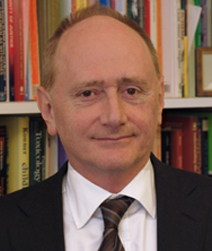 |
David Gough
Professor of Evidence Informed Policy and Practice and Director of the Social Science Research Unit and the EPPI Centre, Institute of Education, University of London
David is part of the central Evidence Informed Policy and Practice (EIPPEE) project team. He joined the Social Science Research Unit (SSRU) in 1998, having previously worked at the University of Glasgow and Japan Women's University. He is the course leader on the MSc in Research for Public Policy and Practice and has designed and delivered numerous short courses on systematic reviews and knowledge use in the UK and internationally. David is also co-editor of the journal Evidence and Policy.
|
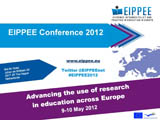

Welcome to 'Advancing the use of research in education across Europe'
|

|
 |
Micheline Scheys
Secretary-General of the Department for Education and Training, Belgium
Micheline Scheys, a sociologist and former researcher, has been at the forefront of education and training policy-making for more than 15 years. She advises the minister, grounding strategic objectives and measures on trends in broader society, international education policy and innovative developments in relevant scientific fields. She is also responsible for the short- and long-term planning, the co-ordination, monitoring and evaluation of policies and the knowledge management within the ministry.
|
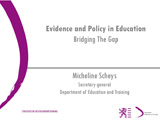

'Evidence and Policy in Education: Bridging The Gap'
|

|

|
Bruno della Chiesa
Senior Analyst, Organisation for Economic Co-Operation and Development (OECD)
Bruno della Chiesa also manages the OECD’s Centre for Educational Research and Innovation (CERI)’s project "Globalisation and Linguistic Competencies".
|


'Global Warming on Neuroscience and Education: Navigating between Scylla and Charybdis'
|

Due to technical issues the recording begins midway through presentation
|
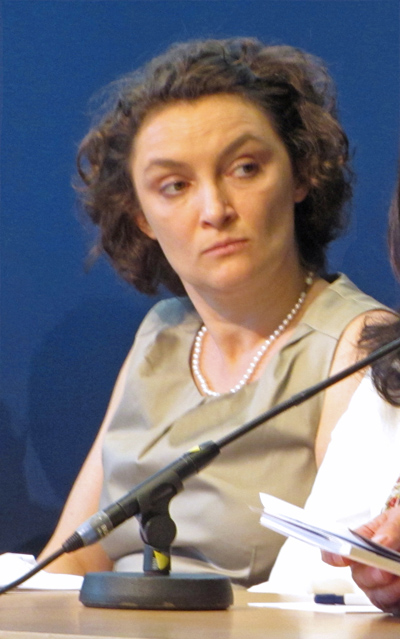
|
Katrien Mondt
Strategic Policy Support, Department of Education and Training
|
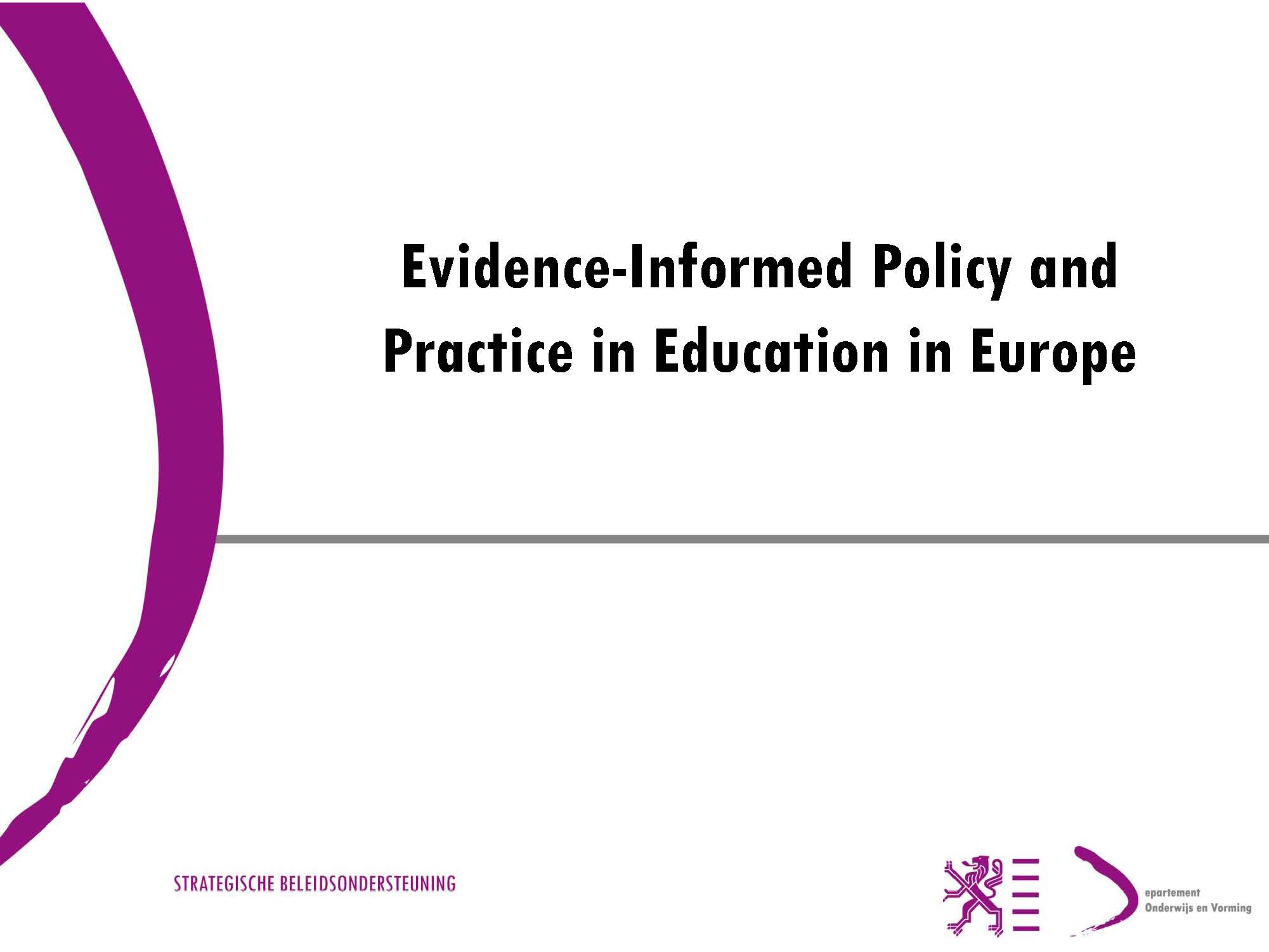

'Evidence informed policy and practice in education in Europe'
|

|

|
Frans Leeuw
Director of the Ministry of Security and Justice Research Center (WODC) since 2003 and Professor of Law, Public Policy and Social Science Research at Maastricht University, the Netherlands since 2005.
Frans Leeuw has previously held positions at Utrecht University, the Netherlands (1992-2006); the Inspectorate for Education, the Netherlands (2000-2003); Humanities and Social Sciences Faculty, Netherlands Open University (1995-2000); Netherlands National Audit Office (Algemene Rekenkamer) (1987-1995); Leiden University (1978-1987); and University of North Carolina at Chapel Hill (1980).
He has authored numerous articles, reports and books in the areas of program evaluation, theory-based evaluations, performance monitoring and auditing and evaluation policies. Fields covered are crime and justice, security and safety, education, development aid and management. He is a regular speaker at conferences, in the Netherlands and abroad.
|
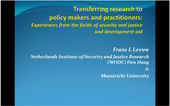

'Transferring research to policy makers and practitioners: Experiences from the fields of security and justice and development aid'
|

|
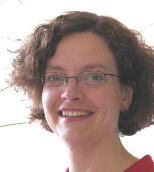
|
Susanne Conze
Policy Officer responsible for school education policy and early school leaving at the European Commission Directorate-General for Education and Culture.
Susanne Conze studied history, sociology and political science in Bochum, Moscow and Bielefeld. After a first work experience in the European Commission from 1999 till 2001, she worked for a German university, supporting the management of European and international research projects. Since 2005 she has worked in the European Commission for the Directore General for Education and Culture.
|
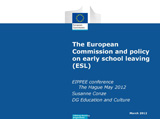

'The European Commission and policy on early school leaving (ESL)'
|

|
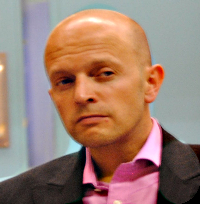 |
Mark Newman
Mark Newman is part of the central Evidence Informed Policy and Practice (EIPPEE) project team.
Mark’s background includes health, social sciences and education and he has worked in the NHS as well as in Higher Education. His academic interests span three inter-related areas: Developing methods and processes for and producing systematic reviews for policy and practice decision making across different areas of social policy including education; Capacity building amongst practitioners, researchers and policymakers to produce, critically appraise and utilize research evidence; Methods for the design and evaluation of effective learning environments in professional and clinical education.
|
|
Podcast unavailable |
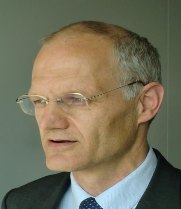 |
Richard Deiss
Policy Officer - Knowledge of Education & Training - Evidence based policy Higher Education, Learning Mobility and Equity indicators, European Commission Directorate-General for Education and Culture
|
|

|
|
|
The conference gave attendees several opportunities for active engagement. In one session, participants had to consider the issues involved in using a systematic review of interventions to reduce early school leaving to advice policy makers on their decision-making. Using innovative methods of social media, participants used Twitter to record their discussions on the conference hashtag #EIPPEE2012.
The conference included twelve parallel workshop sessions that focused on how the use of research evidence can be advanced by:
- Gaining a better understanding of the different types and ways that policy-makers, teachers and other practitioners use research evidence.
- Raising awareness and understanding about how knowledge centres can facilitate evidence use and experiences of doing this in practice.
- Providing better access to research evidence and improving strategies to find evidence that is relevant for policy and practice.
- Knowledge and understanding about the range and effectiveness of different ways that research evidence has been, and is being, used in policy and practice.
- Raising awareness about how research evidence can be used to develop or inform innovative practices and how this can be encouraged.
- Utilising the new Evidence Informed Policy and Practice web portal to create customised and searchable 'maps' of research resources.
Presentations from these workshops are now available to view.
|
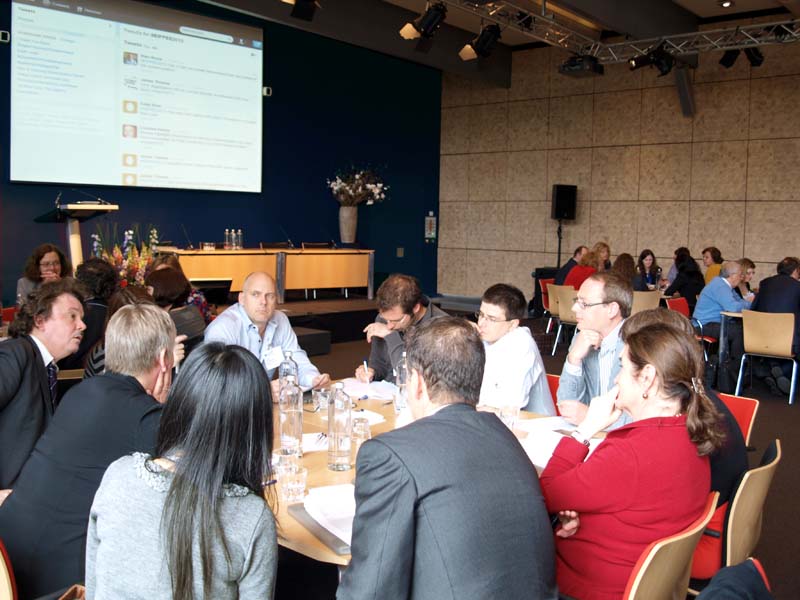
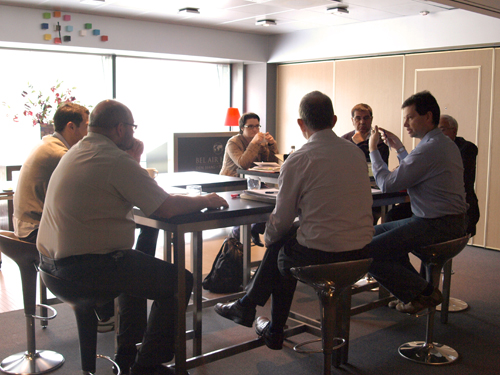
|
|
Twelve posters were also presented at the EIPPEE conference. These posters showcased some of the interesting work going on across Europe to study evidence informed policy and practice and achieve it in practice. The poster presentations include many examples of work being undertaken across South East and broader Europe.
You can now view the poster presentations.
|
Directly preceding the conference was a training workshop. This workshop introduced the concept of evidence informed policy and practice and demonstrated the role that systematic reviews can play in this process. It showed how systematic reviews can address all types of questions and analyse all types of quantitative and qualitative primary research. The workshop also explained the different stages involved in undertaking a systematic review.
In total, 26 participants from 12 different countries participated in this workshop including representatives from Belgium, Croatia, Hungary, Ireland, Italy, Netherlands, Norway, Romania, Serbia, Slovenia, Spain and United Kingdom. These participants came from a variety of roles including: a consultancy company; a non-governmental citizens’ association; national level policy-makers and research council; a representative from a European Union agency; a further education college; trade union; as well as representatives from different regional policy-making organisations.
PowerPoint slides from this training workshop are now available to view.
|
|
Overall, the key message from the conference was that despite the complexity of the evidence-to-use system, there is huge potential for the EIPPEE Network to work together in a multi-disciplinary collaboration to achieve more evidence informed policy and practice in education across Europe. Doing this requires more knowledge and understanding about the different ways that evidence use can be achieved and greater creativity in disseminating knowledge and creating structures to support research use amongst policy-makers and practitioners. It also requires greater critical reflection and study of both good and bad practices to inform future efforts in this area.
These are all issues that the project is keen to take forward in our next conference that is due to take place in Spring 2013 in Frankfurt, Germany. We hope that this conference will build upon what we have learned and achieved in The Hague and provide a solid foundation for us to continue the important work of increasing evidence informed policy and practice in education in Europe after the project’s end.
|
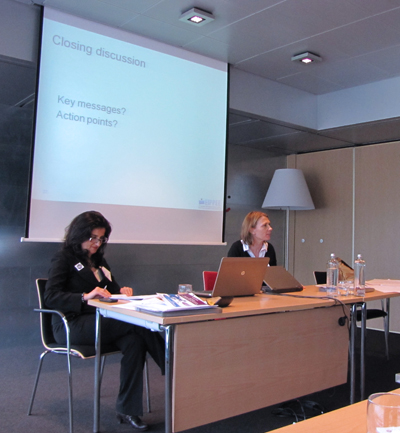 |
|